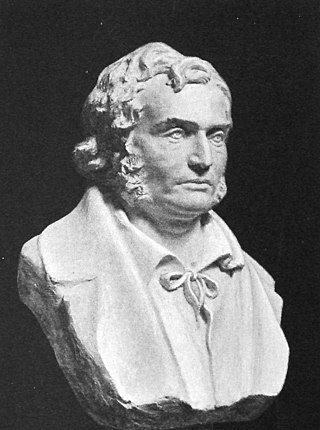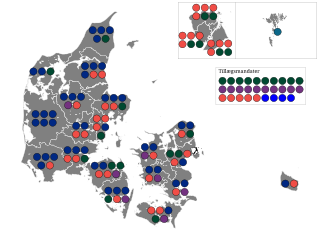| | ||||||||||||||||||||||||||||||
| ||||||||||||||||||||||||||||||
All 102 seats in the Folketing 52 seats needed for a majority | ||||||||||||||||||||||||||||||
| ||||||||||||||||||||||||||||||
 |
|---|
 |
|---|
Folketing elections were held in Denmark on 20 April 1892. [1]
| | ||||||||||||||||||||||||||||||
| ||||||||||||||||||||||||||||||
All 102 seats in the Folketing 52 seats needed for a majority | ||||||||||||||||||||||||||||||
| ||||||||||||||||||||||||||||||
 |
|---|
 |
|---|
Folketing elections were held in Denmark on 20 April 1892. [1]
 | |||||
|---|---|---|---|---|---|
| Party | Votes | % | Seats | +/– | |
| Højre | 34.8 | 31 | +7 | ||
| Moderate Venstre | 28.1 | 39 | New | ||
| Venstre Reform Party | 28.1 | 30 | –45 | ||
| Social Democratic Party | 8.9 | 2 | –1 | ||
| Total | 102 | 0 | |||
| Registered voters/turnout | 363,277 | 63.8 | |||
| Source: Hatting [1] | |||||

Poul Martin Møller was a Danish academic, writer, and poet. During his lifetime, he gained renown in Denmark for his poetry. After his death, his posthumously published fiction and philosophical writings were well received. He also devoted several decades of study to classical languages and literature. While serving as a professor at the University of Copenhagen, he was a mentor to the philosopher Søren Kierkegaard.

Assistens Cemetery in Copenhagen, Denmark, is the burial site of many Danish notables as well as an important greenspace in the Nørrebro district. Inaugurated in 1760, it was originally a burial site for the poor laid out to relieve the crowded graveyards inside the walled city, but during the Golden Age in the first half of the 19th century it became fashionable and many leading figures of the epoch, such as Hans Christian Andersen, Søren Kierkegaard, Christoffer Wilhelm Eckersberg, and Christen Købke are all buried here.

Folketing elections were held in Denmark on 9 April 1895.

Folketing elections were held in Denmark on 6 May 1915. In order to make amendments to the constitution, the government called for the dissolution of both the Folketing and the Landsting to allow a new Rigsdag to make the revisions. However, as this was during World War I, no campaigning took place, and 105 of the 115 were uncontested.

Folketing elections were held in Denmark on 26 April 1920, except in the Faroe Islands, where they were held on 20 May. The election campaign was the most aggressive and bitter in Denmark in the 20th century. Voter turnout was 80.6% in Denmark proper and 58.8% in the Faroe Islands.
Landsting elections were held in Denmark on 10 August 1920, with the exceptions that the seats elected by the resigning parliament were elected on 26 June, the Faroese member was elected on 23 August, and the electors that elected the candidates standing in the constituencies were elected on 30 July.
Landsting elections were held in Denmark on 1 October 1920, with the exceptions that the seats elected by the resigning parliament were elected on 10 September, except for the representative of South Jutland County who was elected on October 7, the Faroese member was elected on 3 February 1921, and the electors that elected the candidates standing in the constituencies were elected on 24 September 1920.
Folketing elections were held in Denmark on 21 January 1890.
Folketing elections were held in Denmark on 28 January 1887.
Folketing elections were held in Denmark on 25 June 1884.
Landsting elections were held in Denmark on 23 September 1924, with the exception that the electors were elected on 18 September.
Landsting elections were held in Denmark on 21 September 1928, with the exceptions that the electors were elected on 14 September, that the candidates elected by the resigning parliament were elected on 15 August, and that the Faroese candidate was elected by the Løgting on 23 August.
Landsting elections were held in Denmark on 13 September 1932, with the exception that the electors were elected on 5 September.
The Society of the Friends of Peasants was a liberal Danish political society founded on 5 May 1846 by members of the provincial consultative assemblies Johan Christian Drewsen and Balthazar Christensen, with the intent to promote the liberation of the peasantry and equality among the different classes of society. Among its most politically influential members were Anton Frederik Tscherning, Jens Andersen Hansen and Carl Christian Alberti.
Landsting elections were held in Denmark on 6 April 1943, with the exception that the electors were elected on 23 March. Along with the corresponding Folketing election, it was the first election during the German occupation, and although many people feared how the Germans might react to the election, the event took place peacefully.
Landsting elections were held in Denmark on 11 April 1947, with the exceptions that the electors were elected on 1 April 1947, that the candidates elected by the resigning parliament were elected on 7 March, and that the Faroese member was elected by the Løgting on 26 March.

Danish jazz dates back to 1923 when Valdemar Eiberg formed a jazz orchestra and recorded what are thought to be the first Danish jazz records in August 1924. However, jazz in Denmark is typically first dated to 1925, when bandleader Sam Wooding toured in Copenhagen with an orchestra. This was the first time most Danes had heard jazz music. Some prominent early Danish jazz musicians include Erik Tuxen who formed a jazz band and was later named conductor of the Danish Radio Symphony Orchestra; Bernhard Christensen, an art music composer who incorporated jazz elements into his pieces, and Sven Møller Kristensen, who was the lyricist for many of Bernhard Christensen's pieces and who wrote a book on jazz theory in Danish.
Tårnborgvej is a dead end street extending from the northside of Gammel Kongevej, one block East of H. C. Ørsteds Vej, in the Frederiksberg district of Copenhagen, Denmark.
Inge Hvid-Møller (1912–1970) was a Danish actress and stage director. She is remembered for performing roles in Jean Anouilh's plays, in particular the title role in Antigone in 1946. From the 1950s she directed plays including Chekhov's Onkel Vanja (1953) at the Allé-Scenen. Hvid-Møller also performed in several films, including Jeg mødte en Morder (1943).